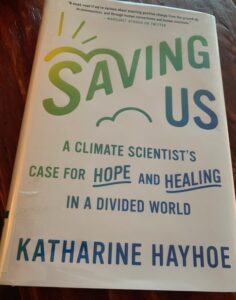I first learned of Katharine Hayhoe several years ago when I participated in the Creation Care group at the church we were attending. One of the fellow group members was excited that Hayhoe was coming to Anchorage and we would had opportunity to hear her speak. Unfortunately, I was unable to attend any of her events while she was here, but I have kept an eye on her work ever since and was glad to tune in when Krista Tippet interviewed her for an OnBeing podcast this fall. It’s an excellent conversation, and I recommend it! Based on that conversation, I got a copy of Hayhoe’s book, Saving Us, and just finished reading it. It was fun to find a few paragraphs in it documenting her trip to Alaska, and how my Creation Care friend welcomed her at the airport and served as host and tour guide during some of her time here.
I think one of the things I most like about Hayhoe is that, in spite of the terrible, life-changing/ending realities of climate change that are happening in real time (our decade in Alaska LEAVES ME NO DOUBT THIS IS SO), she leans into hope.
She notes, “Science tells us it’s too late to avoid all of the impacts of climate change. Some are already here today. Others are inevitable, because of the past choices we’ve made, and that can make us afraid. Science also tells us that much of what we do is actively contributing to the problem, from turning on our lights to what we eat for lunch. That makes us feel guilt. But the research I do is clear: it is not too late to avoid the most serious and dangerous impacts. Our choice will determine what happens.”
Hayhoe frames a variety of ways that individuals can push back against the despair, the fear, and the guilt, by making helpful, hopeful choices.
From her conversation with Krista Tippett –
Hayhoe…….hope does not begin in a place of positive circumstances, and hope is not the guarantee of a positive outcome. One of the times in history when people were most hopeful was during the London Blitz. And they were hoping against hope. I mean, talk about — like, you couldn’t even go to sleep at night. You might wake up and your entire family and the whole block that they lived on could be gone.
Tippett:And you’re talking about what I refer to as a muscular hope. This isn’t about optimism; it’s not about wishful thinking. It’s about insisting that we can be agents of change; that what is doesn’t have to be, right?
Hayhoe:Oh, that’s perfect.
Tippett:And it’s about throwing your body and your life behind that.
And this reminds me of a conversation I had this summer with a shop owner in Oregon, when I was there. As he trailed through a long list of (not just climate change) woe in our world (and I had to agree with him because I have been watching the news and living through these days too) he got to the end and he said “…….but, I still recycle.” I laughed! Because, YES. I DO TOO. I know my recycling doesn’t change the world. I know I do it imperfectly. And how many stories have I read about how recycling isn’t even what I think it is as I diligently put stuff in my bin to be hauled off and repurposed, according to my imagination?!? And yet, I pay attention, doing my best to reduce, reuse, and recycle, because in doing so, I am practicing hope.
Edited 1/4/22 to add a link to this NYT Interview with Hayhoe. Many things of interest to me in here, perhaps I’ll circle back with some thoughts later.

 Cinderella at the ball
Cinderella at the ball